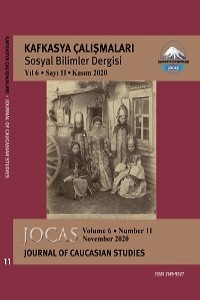Victimization Discourse in Armenia: Turkey as the Other [Ermenistan’da Mağduriyet Söylemi: Öteki Olarak Türkiye]
Egemen söylemin sürdürülmesinde hem pratik hem de dil çok önemlidir. Popülasyona tercih edilen anlamı empoze etmek için ikili karşıtlıklar oluşturulmalıdır. Bu karşıtlıklar, “biz ve onlar” temelinde kimlikler inşa etmeyi amaçlar. İkili karşıtlıklar, Ermeni ulusal kimliğinin inşasında da önemli bir rol oynamıştır. Mitoloji temsilleri, toprak iddiaları (Büyük Ermenistan Projesi) ve Ermeni Soykırımı, 19. yüzyıldan itibaren pratikte Türk düşmanlığını ateşledi. Kimlik inşasında, Ermeni devletinin kurulmasından sonra iki söylemsel kayma yaşandı. İlk değişim, kimlik inşasının asli unsurlarını dışlayarak Türkiye ile iyi bir ekonomik ilişki kurmak için Türk ötekiliğini en aza indirmeye çalışan ilk başkan Ter-Petrosyan döneminde ortaya çıktı. Robert Koçaryan'ın yeni cumhurbaşkanlığı dönemiyle birlikte, hem ilkel hem de sivil unsurları birleştirerek ulusal kimlik inşasında ikinci söylemsel kayma meydana geldi. Türk Ötekiliği, yeni mağduriyet söylemiyle yeniden ortaya çıktı. Yeni söylemin ana temsili, sadece insanların zihninde değil, ülkenin dış politikasında da Türkiye'yi Öteki olarak hedef alan Ermeni Soykırımı idi. Ermeni soykırımını yeniden siyasi gündeme almak ve Ermeni soykırımının dış politikada tanınması yeni söylemin temel amacıydı. Tarihsel gerçekleri ve söylemsel değişimleri göz önünde bulundurarak, bu çalışmada Türk ötekiliğinin Ermeni ulus inşasında nasıl önemli bir rol oynadığını ve Koçaryan'ın cumhurbaşkanlığı döneminde Türkiye'yi öteki olarak hedef alarak yeni mağduriyet söyleminin nasıl ortaya çıktığını ve Ermeni dış politikasını nasıl temsil etmeye başladığını analiz etmeyi amaçlıyorum.
Anahtar Kelimeler:
Mağduriyet Söylemi, Ötekileşdirme, Kimlik inşası
Victimization Discourse in Armenia: Turkey as the Other [Ermenistan’da Mağduriyet Söylemi: Öteki Olarak Türkiye]
Both practice and language are very crucial in in the perpetuation of dominant discourse. In order to impose the preferred meaning to the population, binary oppositions should be created. These oppositions aim to construct identities on the basis of “us vs them”. Binary oppositions have also played a crucial rule in Armenian national identity construction. The representations of mythology, land pretensions (Great Armenia Project) and Armenian Genocide ignited Turkish hostility in practice starting from 19th century. In identity construction, two discursive shifts happened after the establishment of Armenian statehood. The first shift appeared during the first president- Ter-Petrosian’s period who tried to minimize Turkish otherness in order to create good economic relation with Turkey by excluding the primordial elements of identity construction. With the new presidential period of Robert Kocharian, the second discursive shift occurred in national identity construction by combining both primordial and civic elements. Turkish Otherness again re-emerged through the new discourse of victimization. The new discourse’s main representation was Armenian Genocide which targeted Turkey as the Other not only in the minds of people, but also in the foreign policy of the country. To include again Armenian genocide to political agenda, and recognition of Armenian genocide in the foreign policy was the primary aim of new discourse. Considering the historical facts and discursive shifts, I aim to analyze how Turkish otherness have played an important role in Armenian nation-building and how the new discourse of victimization emerged and started to represent Armenian foreign policy by targeting Turkey as the other during the presidential period of Robert Kocharian.
Keywords:
Victimization, Otherness, Discursive Shifts,
___
- Akbulut, Ilhan. 2014. Armenians in Turkish History. Ankara: Ankara University. Journal SBF.
- Alp, Ilker. 2009. «The Historical Invalidity of of the Armenian Claims .» Trakya University Journal of Social Sciences 1-30.
- Policy Forum Armenia. 2010. Armenia Diaspora Relations: 20 years since Independence. doi:https://www.pf-armenia.org/sites/default/files/documents/files/PFA%20Diaspora%20Report.pdf.
- Astourian, Stephan H. 2001. From Ter-Petrosian to Kocharian: Leadership Change in Armenia. Berkeley: University of California.
- Barseghyan, Kristine. 2007. «Changing Turkish Other in Post-Soviet Armenian Discourse on National Identity.» (Polish Sociological Association) 283-298. doi:https://www.jstor.org/stable/41275020.
- —. 2003. Rethinking Nationhood: Post-Independence Discourse on National Identity in Armenia. Polish Sociological Association. doi:https://www.jstor.org/stable/41274871.
- Barth, Yossi Shain & Aharon. 2003. Diasporas and International Relations Theory. Cambridge University Press. doi: https://www.jstor.org/stable/3594834.
- Boumoutian, George A. 2006. A Concise History of the Armenian People. (From Ancient Times to the Present). Costa Mesa California: Mazda Publishers.
- Canyurt, Dilek. 2016. Armenian Foreign Policy and Constructivism: The Case of Turkey. Pamukkale University. Social Sciences Institute Journal.
- Caykiran, Selçuk Ural & Güzin. 2011. Armenian Foreign Policy in The Ruling Period Robert Koçaryan. Journal of the Institute of Social Sciences.
- Derrida, Jacques. 1978. Writing and Differrence. Chicago: University of Chicago.
- Foucault, Michel. 1954. Lives of Infamous Men, in Power: Essential Works of Foucault. Редактор James Faubion. Т. III. New York: The New Press.
- Hopf, Ted. 1955 and 1999. «Social Construction of International Politics: Identities and Foreign Policies.» Slavic Review. Дата обращения: January 2003 г. doi:http://dx.doi.org/10.2307/3650193.
- Lachiner, Sedat. 2003. Armenian Claims and Terrorism. Ankara: Ankara University Press.
- Markarov, Kornely Kakachia & Alexander. 2016. Values and Identity as Sources of Foreign Policy in Armenia and Georgia. Tbilisi: Academic Swiss Caucasus Net.
- Miller, Donald E. Miller & Lorna Touryan. 1999. Survivors: An Oral History of the Armenian Genocide. Berkeley, Los Angeles: University of California Press.
- Newspaper, Azg. 2004. «Why Kocharian Refused to Participate in Summit.» Azg Newspaper 119: 12-45. doi:Http://Www.Azg.Am/Am/2004062902.
- NTV. 2005. «Kocharian: We don't have territorial claim.» Http://Arsiv.Ntvmsnbc.Com/News/318446.Asp#Body.
- Poghosyan, Ruzan. 2005. «Turkey's Prime Minister stated that Recognition of the Armenian Genocide is a Secondary Problem.» Azg Newpaper 129.
- Suny, Ronald Grigor. 1983. Armenia in the Twentieth Century. Chico, California: Scholars Press.
- Tarzian, Mary Mangigian. 1992. The Armenian Minority Problem (1914-1934). Atlanta, Georgia: University of Pennsylvania.
- Ternon, Yves. 1990. The Armenians: History of a Genocide. New York: Caravan Books.
- Ünal, Hüsamettin İnaç & Feyzullah. 2013. The Construction of National Identity in Modern Times: Theoretical Perspective. International Journal of Humanities and Social Science.
- Wendt, Alexander. 1994. Collective Identity Formation and the International State. The American Political Science Review,.
- —. 2012. «Social Theory of International Politics.» doi:https://doi.org/10.1017/CBO9780511612183.
- Yapıcı, Utku. 2013. Track-Two Diplamacy in Turkish Foreign Policy: The Turkish-Armenian Reconciliation Commission Example. Ankara: The Turkish Yearbook of International Relations.
- ISSN: 2149-9527
- Yayın Aralığı: Yıllık
- Başlangıç: 2015
- Yayıncı: Murat TOPÇU
Sayıdaki Diğer Makaleler
Kitap İncelemesi [New Publications]
